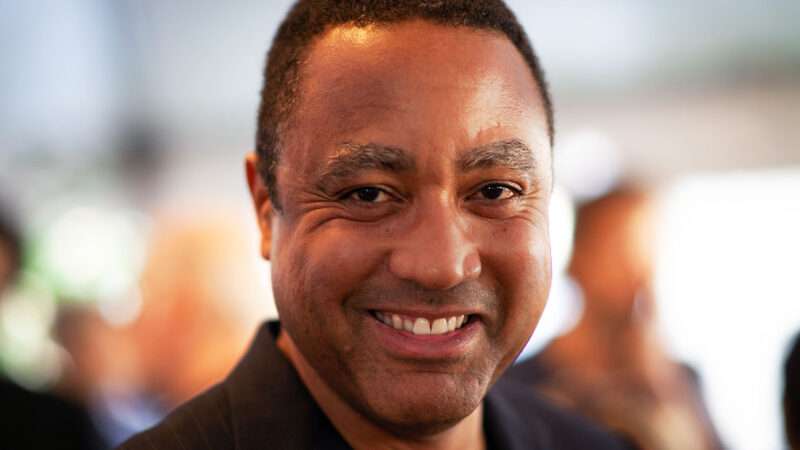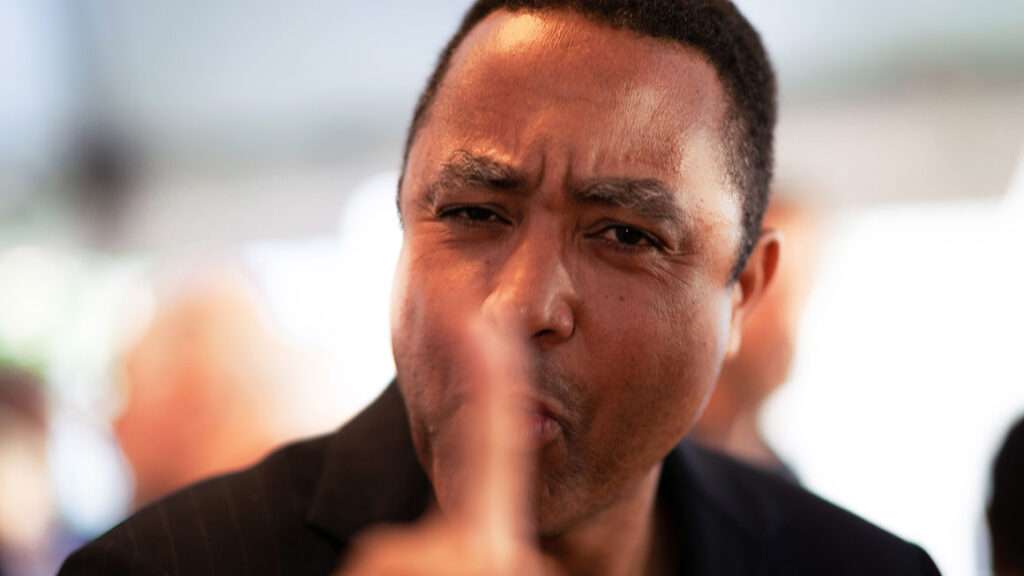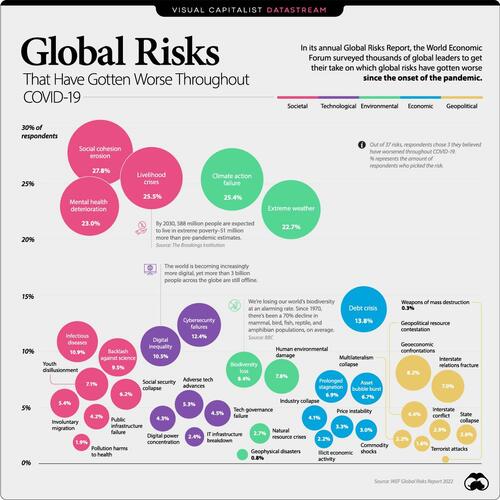
In his bestselling new book, Woke Racism: How a New Religion Has Betrayed Black America (Portfolio), New York Times columnist and Columbia University linguist John McWhorter argues that the ideas of Robin DiAngelo, Ibram X. Kendi, and the Times‘ 1619 Project sharpen racial divides while drawing attention away from actual obstacles to improving quality of life for black Americans.
McWhorter first explored his idea of anti-racism as “Our Flawed New Religion” in a 2015 piece for The Daily Beast and continued the theme in a series of articles for Reason in 2020. “I think something is really distracting people in my world lately into supposing that they’re supposed to fall for a kind of purposeless extremism in order to be good people,” McWhorter says.
Contrary to critics’ vituperative claims, Woke Racism is in no way a right-wing book; McWhorter notes that he’s never voted Republican in his life. “I consider my company to be left-leaning people who read The New York Times and The Atlantic,” he says. “If it were 1960, everybody would think of me as a normal liberal. I would be this Adlai Stevenson–voting, pointy-headed liberal person.” Since the late ’60s, though, the idea has taken hold that “on race, radicalism is default.” Though this attitude has ebbed and flowed over time, McWhorter argues that today’s anti-racist crusaders evince a quasi-religious fanaticism that ends up hurting, not helping, the plights of black Americans.
In November, McWhorter spoke with Reason‘s Nick Gillespie about what white people get out of cooperating with this ideological agenda, what black people gain by “performing” victimhood, and what needs to change so that all Americans can get on with creating a more perfect union.
Reason: What’s the elevator pitch for Woke Racism: How a New Religion Has Betrayed Black America?
McWhorter: There is a group of people who are committed to what they call social justice, certain enough of their moral purity that they are willing to hurt other people if they don’t agree with their principles. Their notion is that they are saving people who are living under the power of white hegemony. Not only are these people mean and unpleasant to deal with, but in the name of social justice for black people, they often either don’t care about black people for real, or they’re hurting black people. I wrote Woke Racism not as some boring statement from the right wing about family values and people pulling themselves up by their bootstraps. This is a book saying there are black people who need help. The people who are calling themselves black people’s saviors don’t understand this. What they’re caught up in is more about virtue signaling to one another than helping people who actually need help.
We’re talking about woke activism—authors like Robin DiAngelo, Ibram Kendi, Ta-Nehisi Coates. Why is it important that you call it a religion?
I call it a religion partly because of formal similarities between it and especially devout Christianity, starting with white privilege as original sin. Not only are those parallels important, but I have a heuristic reason for it. Some people were expecting Woke Racism to be an examination of the nature of religion and wokeness and what the parallels are. Nobody would have read that book. They shouldn’t have; it’s not that important.
I consider it useful to think of this as a religion so that people can understand that we can’t have productive exchanges with the particular kind of person I’m writing about. Many people think, “Well, if we could only get them to understand that we need a plurality of ideas.” Or people ask me, “How can I get that kind of person to not call me a racist?” You can’t. That’s what they do.
You’re unlikely to try to convince somebody that Jesus does not love them; you’re unlikely to try to talk someone out of their religious faith. Framing it as a religion gets across that idea better than just calling it an ideology.
You critique terms such as systemic racism. Are we past the age of systemic racism?
Racism in the present tense is much harder to identify than racism in the past. I don’t like that term, not because of the systemic, but because of the racism. I think it’s a real stretch of our cognition to go from racism being an attitude to racism referring to inequities within a system that are racial. You end up talking about inequities that have a very different nature, and you refer to them all with the term racism, which implies that there’s this one particular issue. We can’t help thinking that it’s partly this emotion, this bias, when really the problems are often due to all sorts of things today, even if they were due to racism in the past. It’s a dangerously oversimplified way of looking at the complexities and the inequities in a society.
For example, redlining. Go back to a redlined neighborhood in 1950; most of the people in it were white. That’s something that we don’t talk about. Redlining was not as racially targeted as a lot of people seem to almost want it to have been. It was about class. Nevertheless, a vastly disproportionate number of black people were caught in these same neighborhoods, so black people suffered disproportionately from redlining. Is that the reason today that a certain wealth gap between white and black people exists? To some extent, yes. But if you actually look at the numbers, if you distinguish between medians and averages, if you distinguish between regions of the United States, if you distinguish between social class, the wealth gap is not what people say.
Certainly the fact that so few black people could build up equity back in the day, not that long ago, was a matter of racism. But today, to look at the wealth gap and say, “This is systemic racism”—no. That was way back in the past. Today, there’s inequity. What do you do about it? Do you give black people a certain amount of money? Do you give black people houses? How much of a house? How much money? It’s complicated. And that’s usually not really what people mean.
What are we talking about, that it is racism? That’s a very odd way of using tense. Racism did something that created a disparity today.
When you look at American culture in 1960 and 1970 on the issue of race, there was a massive transformation. Can you talk a little bit about that?
The two-parent family is still a norm [back in 1960], even with poor black people. Welfare is a mean-spirited little program where you’ve always got the social worker knocking on the door and you’re encouraged not to stay on it for very long. There’s a general idea that how Martin Luther King looked at things was the standard and reasonable way of thinking about race: “Let’s get rid of segregation, view people by the content of their character.”
You go to 1970 and there’s this whole new mood—the black power mood. The new idea is, “We can’t do our best because you won’t let us. And therefore you have to accept that we won’t do our best, and that sometimes we’ll do our worst.” Gradually the notion settles in that doing your worst or not doing your best is almost what black authenticity is, because you stand as a totemic demonstration of white racism. 1960s racism is about segregation. By 1970, it’s standard in certain circles that racism is still present and indestructable because it’s structural.
Because of the welfare revolution in 1966, it starts to become regular for people to just stay on welfare, with no one concerned about whether they get job training. The knocking on the door dwindles in the early ’70s, and it becomes this multigenerational program. It’s not anybody’s fault. Black America turned upside down between ’60 and ’70.
I think that civil rights up to about 1966 and [black activist] Stokely Carmichael and people yelling “black power” and not knowing what it meant—that’s where it went wrong. And we’re still stuck talking about these things the way those people did.
There’s fascinating changes in polling data about race and outcomes in American life. By the end of the Barack Obama years, there was much more racial animosity. According to Gallup and Pew, black people feel that racism has become a bigger issue in their lives, and a lot of white people agree. Do you give any credence to that narrative?
None whatsoever. Obama starts being president in 2009, and then comes the Tea Party, and everybody thinks that that’s mostly because of his race. But I always ask: If John Edwards, with his pretty boy white self but basically the same policies as Obama, had become president, would there have been no Tea Party? I don’t think it would have been any different. The Tea Party happened the way it did because in 2009 Twitter became default, as did Facebook. Those things completely changed the contours of our lives even more than cellphones did.
Then on the American race scene, two things happened: Trayvon Martin’s murder and Michael Brown’s murder. Those two things taught educated America and beyond that black people labor under the threat of being unjustifiably killed by stray or racist white cops.
The saddest thing in the world is that it’s become quite clear over the passage of time that the way both of those events were portrayed was complete myth. I was behind the people protesting both of those cases at the time. I now feel fooled, just like we all feel fooled by, bless his heart, Colin Powell. What happened to Trayvon Martin was not that he was killed unjustifiably by George Zimmerman. It was an unfortunate episode, but Trayvon Martin was also a very different person than we’re led to think. And then also with Mike Brown, it was a lie. For reasons we’ll never know, he kept on charging at that police officer. The idea that [the officer who killed Brown] just shot this guy dead with his hands up in the air—it’s false.
Barack Obama’s Justice Department, headed by Eric Holder, did an exhaustive investigation of the Michael Brown killing and came to the conclusion that you just articulated.
Yet the myth will never die.
The Brown incident did reveal a system of peonage that whole communities, particularly poor communities, often disproportionately black, were held under. You look at places like Ferguson, Missouri, where cops would give out huge numbers of tickets for speeding and other kinds of violations simply to gin up their own budgets.
Yeah, that was real. There are times when there’s a racial disparity where it really does need to have the whistle blown on it. Stop-and-frisk in New York City had gone way, way too far. I wrote about that often and made a lot of people mad. With Ferguson, you learned about how unjust policing in general and all the fines being levied were. But the thing is the level of fury, the level of property destruction, that happened in Ferguson was about Mike Brown. The level of destruction and fury was not about people getting a lot of tickets and spending a night in jail. There could have been a more constructive way of addressing those things.
If the only way that we can get at those real things is to tell a big lie, that’s really a sad way of looking at how sociopolitical change has to happen.
Is blackness as tight a category as it used to be? It was in the late ’90s that the U.S. census allowed a multiracial category for the first time without horrible motivations behind it.
There’s a certain kind of person who is hopelessly devoted to the idea that the essence of blackness is laboring under this oppression from whites. The reality is that those category memberships are going to have to fray. We come from a time when [mixed-race kids] had to accept as they got older that they were black in effect. And that made sense in 1975; there was less room to maneuver in the culture. That’s not true now.
Some people hearing me say that are thinking I mean that I don’t like blackness or that I’m ambivalent about it. But I just think that the category is beginning to not make sense. That includes my daughters. I don’t know if they, when they’re 40, are going to identify as black women, as opposed to just mutt women growing up in an upper-middle-class world, where everybody has a different flavor. What they’re basically becoming is modestly affluent American urban kids.
I worry these days that when people say blackness, what they mean is, roughly, not being buttoned up like Episcopalian whites. I worry that blackness is thought of as, roughly, jamming. I mean this as more than just dancing, but that there’s something that black people are in touch with in terms of rhythm. That blackness is not being too exact—we’re seeing that in so many educational materials. It runs throughout the culture that to be black is to not be precise, is to not be responsible for getting the exact answer. You have a rhythm; you jam. You don’t sit in one place; it’s about the beat. And I worry that [this sense of] blackness is primitive, you know?
The writer Christopher Lasch has a passage about how the term survivor slipped out of postwar narratives of people who survived death camps and gulags. By the end of the ’60s, Betty Friedan was talking about how being an affluent suburban housewife was a form of concentration camp; survivorship had gone from being specific to the Holocaust to more general. We’re in an age now where being a survivor—and making people around you aware of your trauma—seems to be how we talk about everything.
There were psychologists who started doing sessions between white people and black people, where white people’s responsibility was to sign on to the idea that they were creating what we’re now calling trauma among black people. And that lives on in [diversity, equity, and inclusion] initiatives. It starts out as a useful way to call attention to the fact that people are hurting. It’s an analogy. Somebody who’s been teased in school hasn’t suffered the way somebody did in the Holocaust, but you can say that both people are survivors. Once that settles in and people stop processing it as extreme, you do have this usage of the term—kind of like the way we use the term racism—that stops being terribly useful, and sometimes can be almost manipulative and destructive of a person.
In your book, you talk about ways to make things better for black Americans. You suggest three things: End the drug war, teach reading properly, and get past the idea that everyone should go to college.
If there’s no black market selling hard drugs on the street, you can’t drop out of school and do that. There’s no way to avoid getting some kind of legal work. And that’s not always going to be fun when you’re from an underserved community, because life is hard. If you’ve grown up somewhere where you aren’t taught well, and you aren’t taught how to do anything, you’ve got a problem. So not only do you end the drug war, because it destroys black communities by creating that black market temptation that sends people to prison and often to death, but then you also want to have something to catch those men. Those men should be caught in a system that cherishes and funds and values vocational education, with the idea being that he’ll learn how to fix air conditioners and heaters and make a thoroughly middle-class living for the rest of his life.
The idea that what that person needs to do after high school [is to] go spend four years “expanding their mind” in ways that frankly don’t much expand the mind—college is something that should be a choice for some people the way it was before 1945 and the G.I. Bill. I suspect what most people would rather do is go train for a career. If you want to go to college later in your life, that should be allowed, but it shouldn’t be considered the default rite of passage. I cringe whenever I hear anybody talking to an audience about poor people and saying that college needs to be made more available. No, vocational school needs to be more available!
Teach reading properly—how did you come up with that?
That sounds so wonky. It sounds like I must have some sort of particular commitment to pedagogy. It’s not that. Something that keeps kids, especially ones not from book-lined homes, from engaging with school is being taught reading wrong. It started with the whole controversy over whether Ebonics should be used in the schools in Oakland in 1997. If you were a part of that controversy, you learned about problems with reading that would lead anybody to think that the issue was black dialect. That wasn’t the problem.
You wrote a whole book showing that black dialect is a really effective form of communication.
I also wrote another book saying that black dialect is not the reason that poor black kids have trouble learning to read standard English. It’s that they weren’t being taught to read right at all. If you’ve got a good phonics program, you’ve got a kid who will not, at around 8 years old, turn away from school because they just find reading too difficult.
I’m not sure how many [readers of the book] have the experience of knowing somebody who’s about 25 years old, grew up the hard way. I’ve known black people like this; there are white people like it too—somebody where you’re at the restaurant and they’re moving their lips when they read the menu because, you know, menus are tough to read. Almost always, it’s somebody who went to a school where they basically just threw some kid books at them and had them take it in by osmosis. That’s not how you teach people how to read. It really worries me because, disproportionately, black kids suffer from that.
So I really do think: Have kids learn to read so they’re less likely to drop out of school. Then, when they leave school, no black market within the neighborhood. I completely understand why people would choose that, but that shouldn’t be available. What should be available is good, solid vocational training so that they can go out into the world and lead the kinds of productive lives that their grandfathers did. I’m modeling this on black communities in big cities in, say, 1949. That was no paradise by any means, but most black men worked legal jobs.
What are your rhetorical and discursive strategies for dealing with the “elect,” your term for social-justice activists?
There’s a certain kind of person who thinks that battling power differentials is supposed to be central to everything we do. The idea is that those power differentials exist, and until they don’t, everything else is fiddling while Rome burns. That kind of person, if you disagree with them, calls you a white supremacist.
There are two things that we have to do: One is we have to get used to being called that name and walking on, instead of thinking that [being] called a racist on social media stains us like Hester Prynne. And two, that kind of person needs to be told, “No.”
I think a lot of us, especially since June 2020 and [the killing of] George Floyd, have thought, when that person comes along talking about social justice and hegemony and intersectionality, and tells you that we’re going to change all of our procedures, and if you disagree, we’re going to call you names on social media or get you fired, that our job is to say yes.
The people calling for that need to be told no. They don’t need to be abused, but just: “No. We don’t agree with you that battling power differentials should be the center of our endeavor here. It will be one of about a dozen things that we do. It will not be the center. And if you don’t like it, you have to leave. And I don’t care what you call me.”
This interview has been condensed and edited for style and clarity. The full video version can be viewed here.
The post How To Talk About Racism appeared first on Reason.com.
from Latest – Reason.com https://ift.tt/3Gxs07dZV
via IFTTT












